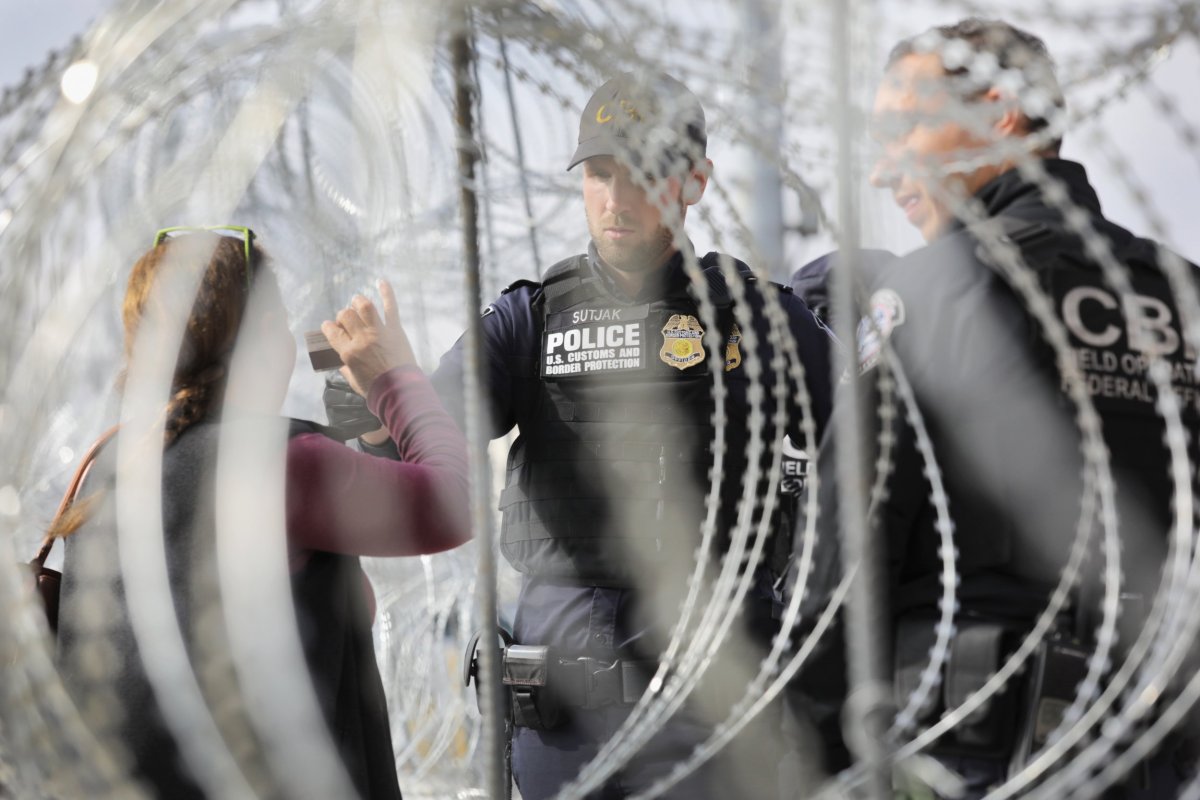In the lead-up to the midterm elections, President Donald Trump and others in his administration were accused of making unfounded suggestions that foreign terrorists could be among a caravan of thousands of Central American migrants traveling toward the U.S.
While Trump later admitted that there was "no proof" of any terrorists being among the caravan, the message appears to have stuck with Americans, with a new study finding that one in four still believes there are terrorists among the migrants heading to the U.S. to seek asylum.
Conducted by the Monmouth University Polling Institute, the study, which looked at American perceptions of the caravan, found that 25 percent of Americans believed that the migrant group "includes terrorists," while another 13 percent "are not sure, but believed this claim is likely to be true."

Meanwhile, 22 percent of Americans said they did not believe there were terrorists traveling with the caravan, while 28 percent said that such a claim "is less likely to be true," the study, which saw 802 adults in the U.S. surveyed over the telephone between November 9 and November 12, found.
Trump was accused of stoking immigration fears last month in the lead-up to the November 6 midterm elections after he claimed that "unknown Middle Easterners" were among those traveling with the caravan.
Questioned repeatedly about the claim last month, however, the president conceded that "there's no proof of anything," but he still made the unfounded claim that terrorists "could very well be" among the group.
Since the caravan first embarked on its journey to the U.S. from San Pedro Sula, Honduras, on October 13, it has been followed by several other caravans departing from Central America.
In recent days, thousands of migrants traveling with the first group had started to arrive in the Mexican border town of Tijuana, which sits across from San Diego, California, where many hoped to seek asylum at the San Ysidro port of entry.
As migrants prepared to make their asylum claims in the U.S., the Monmouth study found that 29 percent of Americans believe that the caravan represents a "major threat to the U.S.," while 24 percent said they see it as a minor threat.
At least 39 percent, however, said they did not see the caravan as a "real threat to the country."
Between parties, the study found a clear divide, with the majority of Republicans (54 percent) branding the caravan a "major threat," while just 11 percent of Democrats and 28 percent of independents agreed.
The study also found regional differences, with residents of the four states that share a border with Mexico—California, Arizona, New Mexico and Texas—being the least likely to "be worried about the caravan," with only 21 percent seeing it as a major threat.
Meanwhile, residents of the Southeast (35 percent), Midwest (33 percent) and Mountain-Northwest (33 percent) regions were more likely to view the caravan as a major threat.
Meanwhile, Northeast residents were found to share views more in line with those living in border states than elsewhere in the country, with 25 percent deeming the caravan a significant threat.
"Most of the public express some level of concern about the approaching caravan, some of which may be due to unsubstantiated claims that the group includes terrorists," Patrick Murray, director of the independent Monmouth University Polling Institute, said in a statement.
At the same time, however, Murray said that most Americans also "feel that each migrant should be given the opportunity to state their case for entering the United States."
Related: An Obama-appointed federal judge just blocked Trump's "illegal" asylum ban
Indeed, the same study found that 70 percent of Americans believe migrants traveling to the U.S. should be given the opportunity to enter the country "if they meet certain requirements, such as showing they were persecuted in their home countries and not having a criminal record."
Another 26 percent, however, said they believe migrants should be sent back to their home countries as soon as they reach the border.
Disparities were once again clear between parties, with a majority of Republicans (51 percent) asserting that caravan members should be turned back to their home countries, while 43 percent said they should be given the opportunity to enter.
The majority of Democrats (89 percent) and independents (72 percent), however, said they supported giving migrants in the caravan a chance to enter the U.S.
The study's findings come as thousands of migrants in Tijuana prepared to make their asylum claims at San Diego's San Ysidro port of entry.
Already, tensions had started to flare in the border town, with residents of Tijuana protesting in the streets and demanding that migrants "get out."
On Friday, Tijuana's Mayor, Manuel Gastelum, warned that the city was not equipped to handle the growing number of migrants arriving in the city, asserting that he believed their numbers could grow to 10,000 over the coming weeks.
Trump dismissed the mayor's concerns, however, writing in a tweet: "Likewise, the U.S. is ill-prepared for this invasion, and will not stand for it."
"They are causing crime and big problems in Mexico," Trump said, before telling migrants, "Go home!"
The president's bid to discourage migrants from entering the U.S. has faced yet another hurdle, however, with a federal judge temporarily barring the Trump administration from banning people caught entering into the U.S. illegally from making asylum claims with a temporary restraining order issued on Monday.
Uncommon Knowledge
Newsweek is committed to challenging conventional wisdom and finding connections in the search for common ground.
Newsweek is committed to challenging conventional wisdom and finding connections in the search for common ground.
About the writer
Chantal Da Silva is Chief Correspondent at Newsweek, with a focus on immigration and human rights. She is a Canadian-British journalist whose work ... Read more
To read how Newsweek uses AI as a newsroom tool, Click here.








